Pope Francis

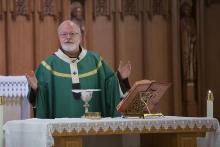
Following up on remarks to “60 Minutes” about the clergy sex abuse crisis and other controversial topics, Boston Cardinal Sean O’Malley has stressed that the Catholic Church needs a system to hold bishops accountable and must “avoid crowd-based condemnations.”
“We are all aware that Catholics want their leaders to be held accountable for the safety of children, but the accountability has been sporadic,” O’Malley wrote in a column posted Nov. 19 at the website of the archdiocesan newspaper. “We need clear protocols that will replace the improvisation and inertia that has often been the response in these matters.”
“Bishops also deserve due process that allows them to have an opportunity for a fair hearing,” he added.
O’Malley’s column was responding to both praise and criticism of his CBS interview broadcast Nov. 16 in which he said the Vatican needs to respond “urgently” to cases like that of Missouri Bishop Robert Finn, who remains in office despite a conviction in 2012 for failure to report concerns about a priest, the Rev. Shawn Ratigan, who was later convicted of federal child pornography charges.
The cardinal said Francis, who recently sent a Canadian archbishop to Finn’s diocese to investigate, was personally aware of the situation.
In the “60 Minutes” interview, O’Malley also called the Vatican’s investigation of American nuns a “disaster” and said if he were starting a church “I’d love to have women priests,” but he added that’s not what Jesus did. Both comments sparked strong reactions.

Market speculation and pursuit of profits are hindering the global fight against hunger and poverty, Pope Francis said Nov. 20.
In an address at a U.N. conference in Rome on nutrition, the pope urged the world’s wealthiest nations to do more to help those in need.
“Perhaps we have paid too little heed to those who are hungry,” the pope told delegates from more than 170 countries attending the global gathering at the U.N.’s Food and Agriculture Organization.
“It is also painful to see that the struggle against hunger and malnutrition is hindered by ‘market priorities,’” the pope said.
“The hungry remain, at the street corner, and ask to be recognized as citizens, to receive a healthy diet. We ask for dignity, not for charity.”
The Argentine pope has often called for greater compassion and justice for the world’s poor since his election last year, and he has made charity a priority of his pontificate.

Philadelphia Archbishop Charles Chaput says hot-button socio-sexual issues won’t be the central focus when the World Meeting of Families welcomes Pope Francis to the City of Brotherly Love next year.
Chaput told a Vatican conference on marriage and the family Nov. 19 that next year’s event comes “at a critical moment in global culture” and willaddress a broader scope of concerns.
“It will deal with a wide range of family issues where our religious faith is both needed and tested,” Chaput said.
“These are matters that affect all families, not only in the United States but on a world scale. So we want to focus next year not just on the neuralgic sexual issues that seem to dominate the American media.”
Reflecting the change in emphasis under Pope Francis that was evident at the recent Vatican Synod on the Family, the four-day event in Philadelphia will look at poverty and the family, marital intimacy, raising children, and the impact of divorce, as well as issues affecting the elderly and the disabled.
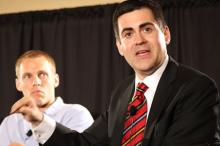
Prominent U.S. evangelicals Russell Moore and Rick Warren blasted the sexual revolution at a Vatican conference Nov. 18 and said it is destroying the institution of marriage.
Moore, the public face of the Southern Baptist Convention, said sexual liberation had created “a culture obsessed with sex” that had simply led to a “boredom of sex shorn of mystery.”
“Western culture now celebrates casual sexuality, cohabitation, no-fault divorce, family redefinition and abortion right as part of a sexual revolution that can tear down old patriarchal systems,” Moore told a global gathering of leaders from Catholic, Jewish, Muslim, and other faiths as part of the “Complementarity of Man and Woman” conference convened by Pope Francis.
The Southern Baptist ethicist said the sexual revolution appeared to have imposed a new patriarchy that enabled men to “pursue a Darwinian fantasy of the predatory alpha male” for the pursuit of “power, prestige, and personal pleasure.”
“Does anyone really believe these things will empower women and children?” he asked. “We see the wreckage of sexuality as self-expression all around us, and we will see more yet.”
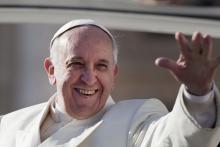
Mayor Michael Nutter announced the news Nov. 17, after the Vatican officially confirmed what has been rumored for months — that Pope Francis will visit the city in September 2015 for the eighth World Meeting of Families.
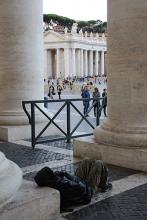
In his latest bid to ease the suffering of the poor — and upend the expectations of the papacy — Pope Francis plans to build showers for the homeless under the sweeping white colonnade of St. Peter’s Square.
Three showers are to be built into refurbished public restrooms provided for Catholic pilgrims along the marble columns leading into the historic basilica, which was completed in 1626.
The Vatican’s deputy spokesman, the Rev. Ciro Benedettini, said Nov. 13 that the project was a joint initiative of the pope and Archbishop Konrad Krajewski, the papal almoner who distributes charity on the pope’s behalf. Construction is due to begin Nov. 17.
It’s an unconventional move, even for a pope who constantly preaches that more should be done to help the poor. It also could rankle traditionalists as the homeless line up to wash beneath the extravagant apostolic apartments that Francis shunned after his election.
“I think it’s a good thing,” said Adrian Sztrajt, a 27-year-old homeless man from the Polish city of Chelm. “I would like to go for showers there.”
Sztrajt and his companion Grzegorz Bialas, also from Poland, sleep with half a dozen others under the porticoes in front of the Vatican press office beside St. Peter’s Square.
Bialas said he’s a fan of the pope but thinks the showers are “a bad idea” since they could attract hundreds of homeless to the Vatican. He also said it was possible for the homeless to get a shower elsewhere in Rome.
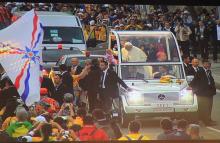
In just one generation, Latin America has seen the number of people who identify themselves as Catholic plummet, with more people becoming Protestant or dropping religion altogether, a new report shows.
The shift is dramatic for a region that has long been a bastion of Catholicism. With more than 425 million Catholics, Latin America accounts for nearly 40 percent of the global Catholic population. Through the 1960s, at least 90 percent of Latin Americans were Catholic, and 84 percent of people surveyed recently by the Pew Research Center said they were raised Catholic.
But the report released Nov. 13 found that only 69 percent of Latin Americans still consider themselves Catholic, with more people switching to more conservative Protestant churches (19 percent) or describing themselves as agnostic or religiously unaffiliated (8 percent).
Even last year’s election of an Argentine as pope to head the Catholic Church has led to conflicting feelings in Latin America.
“While it is too soon to know whether (Pope) Francis can stop or reverse the church’s losses in the region, the new survey finds that people who are currently Catholic overwhelmingly view Francis favorably and consider his papacy a major change for the church,” the report said. “But former Catholics are more skeptical about Pope Francis. Only in Argentina and Uruguay do majorities of ex-Catholics express a favorable view of the pope.”
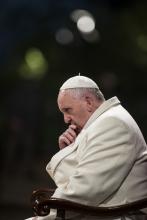
Pope Francis’ penchant for austerity and humility will face a diplomatic challenge when he visits Turkey’s new ostentatious presidential palace on his first visit to the country later this month.
Francis will be the first foreign dignitary to be welcomed by President Recep Tayyip Erdogan at the new 1,000-room palace when he visits Ankara on Nov. 28.
Turkish architects have written to the pope urging him not to go to the palace built by Erdogan and known locally as the “White Palace.”
Larger than the White House or Buckingham Palace in London, the enormous palace was inaugurated last month and expected to cost more than half a billion dollars.
The palace was built on land bequeathed to the state as a forest farm by Mustafa Kemal Ataturk, the World War I general and revered founder of the modern Turkish republic.
The pope is scheduled to give a speech at the palace after a visit to Ataturk’s mausoleum on the first leg of his three-day visit to Ankara and Istanbul.
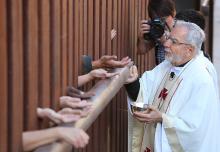
The nation’s Catholic bishops are jumping into the increasingly contentious battle over immigration reform by backing President Obama’s pledge to act on his own to fix what one bishop called “this broken and immoral system” before Republicans assume control of Capitol Hill in January.
In an unscheduled address Nov. 11 at the hierarchy’s annual meeting, Seattle Auxiliary Bishop Eusebio Elizondo, chairman of the migration committee of the U.S. Conference of Catholic Bishops, said the USCCB would continue to work with both parties to pass comprehensive immigration reform.
But, Elizondo said, given the urgency of the immigration crisis and the electoral gains by Republicans who have thwarted earlier reform efforts, “it would be derelict not to support administrative actions … which would provide immigrants and their families legal protection.”
“We are not guided by the latest headlines but by the human tragedies that we see every day in our parishes and programs, where families are torn apart by enforcement actions especially,” he said.
During the summer, the president was moving toward unilateral action on immigration, despite warnings that such moves could exceed his constitutional authority or would turn voters against reform.
Then in early September, Obama said he would delay acting on his own, a move that was seen as a way to protect vulnerable Democrats from any backlash in midterm elections. On Sunday, Obama told CBS’ “Face the Nation” that he was now “going to do what I can do through executive action.”
“It’s not going to be everything that needs to get done. And it will take time to put that in place,” he said.

Pope Francis on Nov. 11 created a new Vatican body to deal with the most serious cases of child sexual abuse and to streamline complaints against the clergy.
The Vatican said the pope would nominate seven cardinals or bishops to consider appeals from clergy accused of abusing minors in a bid to speed up the judicial process of clergy who have received an initial assessment by local bishops.
The members of the panel, or “college,” may come from the Congregation for the Doctrine of the Faith, which currently handles cases, or elsewhere in the church. Members will also be asked to deal with serious abuses of penance in the confessional.
The Vatican’s chief spokesman, the Rev. Federico Lombardi, called the pope’s proposal a “good solution” to help alleviate a backlog of cases.
Bishops accused of sexually abusing minors will still have their appeals handled by a session of CDF members at their monthly meetings.
“This is a good sign Francis is giving: He is basically saying that the CDF remains competent, and gives them an extra instrument to promptly deal with a specific type of appeals against decisions, namely recourses against administrative decrees,” said Kurt Martens, a canon law expert at Catholic University in Washington.
The immediate changes were outlined in a papal rescript, or “Rescriptum,” signed by the Vatican secretary of state, Cardinal Pietro Parolin, and printed in L’Osservatore Romano, the Vatican’s official newspaper.
The pope has adopted a hard line on clerical sex abuse and at times asked for forgiveness while lambasting church leaders more than once for protecting abusers.

With a controversial Vatican summit on family life just concluded and a papal visit to the U.S. expected in less than a year, the nation’s Catholic bishops on Nov. 10 began taking steps to adapt their agenda to the priorities Pope Francis set out — an emphasis on social justice and on creating a more welcoming church.
That change in focus has unsettled a number of American bishops who have been used to a hierarchy oriented more toward hot-button culture war issues like fighting abortion, gay marriage and the Obama administration’s contraception mandate.
The new shift was underscored by last month’s summit, called a synod, where many churchmen used unusually positive language in referring to gay people and cohabiting couples and others who do not always follow church teachings on family life.
In addition, the announcement Nov. 8 that Francis moved U.S. Cardinal Raymond Burke, a vocal conservative and critic of the pope’s approach, out of his curial post, combined with the pope’s surprise choice of low-profile prelate Blase Cupich as archbishop of Chicago have upended long-standing assumptions about how the church operates.
The bishops “still haven’t fully processed what’s taking place right now,” said Rocco Palmo, who runs a popular Catholic website, Whispers in the Loggia.
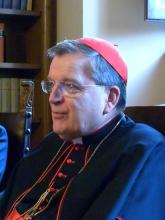
In demoting American Cardinal Raymond Burke from his powerful perch at the Vatican, Pope Francis has sidelined an outspoken conservative agitator – for now.
The pope moved the feisty former archbishop of St. Louis from his role as head of the Vatican’s highest court to the largely ceremonial position of patron of the Knights of Malta on Nov. 8.
Francis has effectively exiled one of his loudest critics, but Burke’s supporters – and his opponents – warn that his position at the Catholic charity may actually give him more freedom to exercise greater influence and even rally opposition to papal reforms.
In other words, the stunning demotion may remake Burke into St. Raymond the Martyr, the patron saint of Catholic conservatives.
“His position as patron of the Knights of Malta is Rome-based and mostly ceremonial,” wrote Edward Pentin for the conservative National Catholic Register.
“He is nevertheless likely to continue and perhaps even step up his defense of the Church’s teaching in the face of continued efforts to radically alter pastoral practice in the run-up to next year’s second synod on the family.”
Burke is well-known for his uncompromising stance on abortion, homosexuality and the sanctity of marriage, and his passion for doctrine is matched only by his passion for the elegant finery of his office.
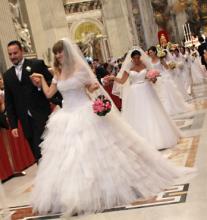
Pope Francis raised the prospect of no-cost marriage annulments on Nov. 5 after revealing he had dismissed a church official for selling annulments for thousands of dollars, which he called a “public scandal.”
The pontiff made the shocking disclosure as he was addressing canon lawyers at the Vatican for a course on marriage dissolution conducted by the Roman Rota, the church’s highest court.
“We have to be careful that the procedure does not become some kind of business,” the pope said. “There have been public scandals.”
“I had to dismiss a person from a tribunal some time ago who said: ‘Give me $10,000 and I’ll take care of both the civil and ecclesiastical procedures.’ Please, not this!”
Francis did not provide any more details about where or when the sacking occurred. He stressed the need for the church’s annulment procedures to be easier, faster and cheaper. He even suggested fees could be waived.
“When you attach economic interests to spiritual interests, it is not about God,” he said.
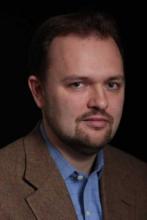
Many conservative Catholics have long viewed Pope Francis with suspicion thanks to his effort to shift the church’s focus away from a culture war agenda and toward a more welcoming approach and a greater emphasis on serving the poor.
But last month’s controversial Vatican summit on the modern family, with the push by Francis and his allies to translate that inclusive view into concrete policies on gays and divorced and remarried Catholics, for example, seems to have marked a tipping point, with some on the right raising the specter of a schism — a formal split that is viewed as the “nuclear option” for dissenters.
New York Times columnist Ross Douthat, a Catholic and a conservative, crystallized the peril in an Oct. 25 column warning the pope not to “break the church” to promote his goals, saying that if Francis continues to alienate conservative Catholics it could lead to “a real schism.”
Douthat had raised the possibility of “an outright schism” earlier this year, as well, and his warnings have been echoed by a number of other church leaders and commentators. The anxiety on the right has also drawn increasing media speculation about the possibility of conservatives splintering off.
So is a schism, with its echoes of medieval debates and heretics burning at the stake, a realistic possibility? And can an independent Catholic church be successful in the modern world?
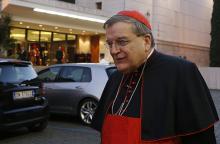
American Cardinal Raymond Burke, the feisty former archbishop of St. Louis who has emerged as the face of the opposition to Pope Francis’ reformist agenda, likened the Roman Catholic Church to “a ship without a rudder” in a fresh attack on the pope’s leadership.
In an interview with the Spanish Catholic weekly Vida Nueva, published Oct. 30, Burke insisted he was not speaking out against the pope personally but raising concern about his leadership.
“Many have expressed their concerns to me. At this very critical moment, there is a strong sense that the church is like a ship without a rudder,” Burke said.
“Now, it is more important than ever to examine our faith, have a healthy spiritual leader and give powerful witness to the faith.”
Burke is the current head of the Vatican’s highest court known as the Apostolic Signatura, but he said recently he is about to be demoted. There is speculation he will be made patron of the Order of Malta, a largely ceremonial post.
“I have all the respect for the Petrine ministry and I do not want to seem like I am speaking out against the pope,” he said in the interview. “I would like to be a master of the faith, with all my weaknesses, telling a truth that many currently perceive.”
“They are feeling a bit seasick because they feel the church’s ship has lost its way,” he added.
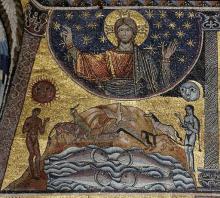
Pope Francis on Oct. 27 waded into the controversial debate over the origins of human life, saying the big bang theory did not contradict the role of a divine creator, but even required it.
The pope was addressing the plenary assembly of the Pontifical Academy of Sciences, which gathered at the Vatican to discuss “Evolving Concepts of Nature.”
“When we read about Creation in Genesis, we run the risk of imagining God was a magician, with a magic wand able to do everything. But that is not so,” Francis said.
“He created human beings and let them develop according to the internal laws that he gave to each one so they would reach their fulfillment.”
Francis said the beginning of the world was not “a work of chaos” but created from a principle of love. He said sometimes competing beliefs in creation and evolution could co-exist.
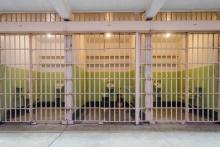
Pope Francis said Oct. 23 that keeping inmates isolated in maximum security prisons is “a form of torture,” and called life sentences “a hidden death penalty” that should be abolished along with capital punishment.
“All Christians and people of good will are called today to struggle not only for abolition of the death penalty, whether legal or illegal, and in all its forms, but also to improve prison conditions, out of respect for the human dignity of persons deprived of their liberty,” the pope told delegates from the International Association of Penal Law.
“And this I connect with life imprisonment,” he continued. “Life imprisonment is a hidden death penalty.”
The pope noted that the Vatican recently eliminated life imprisonment from its own penal code, though that move was largely symbolic.
In the wide-ranging address, Francis denounced practices that are widespread in many regions of the world, such as extrajudicial executions and detentions without trial, which he said account for more than half of all detentions in some countries.
Francis also denounced corruption in penal systems, calling it “an evil greater than sin.”

Half a dozen men stand nonchalantly in front of a grubby building on one of Rome’s busiest streets as cars whizz past. They stiffen whenever a stranger approaches.
But few would guess they’re undercover cops protecting Italy’s most endangered man.
Inside is the Rev. Luigi Ciotti, a 69-year-old priest with soft brown eyes and silver hair who has spent the past 20 years fighting the Italian Mafia.
He runs an organization called Libera, which means free. It’s become a household name because of its efforts to fight criminal organizations, to support victims and to redevelop land confiscated from mob bosses.
Yet Ciotti says there is still a lot more to be done.
“I dream of a country where every person, every citizen wants to assume their responsibility. On that day the Mafia and corruption will cease to exist,” he said in an interview.
Ciotti has had police escorts before, but when a notorious Sicilian boss named Toto Riina issued a death threat from his jail cell a couple of months ago, the authorities immediately doubled Ciotti’s protection.

They say you can feast like a king, and now you can eat like a pope after a young chef from the Vatican’s Swiss Guards published a cookbook featuring the favorite recipes of Pope Francis and his predecessors.
David Geisser, 24, who joined the elite Vatican security corps only a month ago, released his book, titled “Buon Appetito,” in Rome on Oct. 21.
The cookbook includes recipes for Francis’ favorite dishes, such as empanadas; roast sirloin, known as “colita de cuadril”; and “dulce de leche,” a milk-based Argentinian dessert that began appearing on Vatican dining tables when the archbishop of Buenos Aires was elected pope last year.
But it also features one of St. John Paul II’s favorite dishes, Polish pierogi, or stuffed dumplings, and Bavarian delicacies favored by Pope Emeritus Benedict XVI.
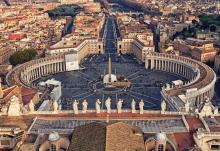
Pope Francis and senior Catholic leaders wrapped up their two-week Vatican summit on the challenges of modern family life on Oct. 19 without reaching a consensus on a number of hot-button topics. So where does that leave Francis’ papacy? And the church?
Here are seven takeaways:
1. Hard-liners won the battle
A midpoint status report on the debate among some 190 cardinals and bishops was described as a “pastoral earthquake” because of its unprecedented (for Catholic churchmen) language of welcome of and appreciation for gay people, as well as divorced-and-remarried Catholics and cohabiting couples.
The media tsunami over that apparent breakthrough panicked conservatives, who waged an intense public and private campaign to make sure none of that language — apparently favored by Francis himself — made it into the synod’s final report. They succeeded, and even the few watered-down paragraphs on gays and remarried Catholics did not reach the two-thirds threshold needed for formal passage.
Hard-liners claimed victory, and headlines spoke of Vatican “backtrack” and a “resounding defeat” for Francis that left his papacy “weakened.”